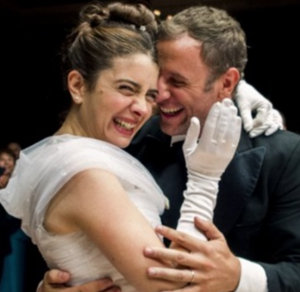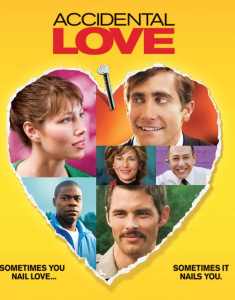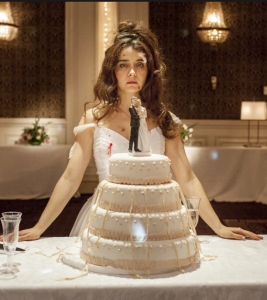 February may be the weirdest time of the year for film. Sure, ’tis the season for the Hollywood romance; witness the box-office success of “Fifty Shades of Grey” and the terrific musical love story “The Last Five Years.” But this is also the season for movies that distributors have written off as unmarketable. And while “unmarketable” can be Hollywood speak for “innovative,” it also is a synonym for “unfathomably awful.”
February may be the weirdest time of the year for film. Sure, ’tis the season for the Hollywood romance; witness the box-office success of “Fifty Shades of Grey” and the terrific musical love story “The Last Five Years.” But this is also the season for movies that distributors have written off as unmarketable. And while “unmarketable” can be Hollywood speak for “innovative,” it also is a synonym for “unfathomably awful.”
Case in point: “Accidental Love.” Released this month on VOD, David O’Russell’s buried comedy about Alice (Jessica Biel), an uninsured waitress unhinged by a brain injury, is as bad as was rumored. O’Russell himself hated this film so much that he demanded his name be removed from the credits. (The pseudonym “Stephen Greene” was used.) Filmed in 2008 in the wake of the badly received “I Heart Huckabees,” the production was so riddled with financial problems that it was shut down at least eight times. Though he never finished it – he refused to shoot a key scene in order to block its release – post-production was eventually completed without O’Russell’s participation. (A pivotal moment is glaringly lacking.)
I was keen to see the film, anyway. The famously hotheaded O’Russell is one of our nation’s most gifted living directors, and it seemed unlikely that he’d make something that wasn’t at least compellingly flawed, especially with a cast that included Tracy Morgan and Catherine Keener. Unfortunately, “Accidental Love” – which was originally (and presciently) titled “Nailed” – is terrible in a way I never would have expected. It’s just plain dull.
Part of the problem is that it is already painfully dated. Loosely based on a novel by Kristin Gore (yes, Al’s daughter), it follows Alice as she launches a Washington, D.C., healthcare revolution after she’s injured in a freak nail gun accident and her fiance (a preening James Marsden) dumps her. Healthcare may still be a hot-button U.S. issue but the debate has shifted in the last seven years. Laws regarding homosexuality have, too; Keener’s queer-baiting congresswoman reads not only as malicious but tone-deaf. Even if the film were timely, its mania would still come off as shrill rather than clever.  Political satire is hard to pull off under the best of circumstances. To add insult to injury, the brilliant Morgan is benched as a poop-obsessed family friend, and Jake Gyllenhaal (playing a mealy-mouthed state rep) and Biel are so hammy they’d give a rabbi an aneurism. We catch glimpses of the film O’Russell was trying to make – when Alice’s doctors discover she’s uninsured, they hilariously stop mid-surgery to wolf hamburgers – but it’s mostly drowned in me-thinks-they-doth-protest-too-much pacing. Overall, this film should be renamed again: “Hit and Run, Baby.”
Political satire is hard to pull off under the best of circumstances. To add insult to injury, the brilliant Morgan is benched as a poop-obsessed family friend, and Jake Gyllenhaal (playing a mealy-mouthed state rep) and Biel are so hammy they’d give a rabbi an aneurism. We catch glimpses of the film O’Russell was trying to make – when Alice’s doctors discover she’s uninsured, they hilariously stop mid-surgery to wolf hamburgers – but it’s mostly drowned in me-thinks-they-doth-protest-too-much pacing. Overall, this film should be renamed again: “Hit and Run, Baby.”
The Spanish-language import “Wild Tales” is a far more engrossing February release. Typically, the most intriguing foreign fare arrives stateside earlier in the year; by summer, Hollywood pushes the prestige pics that reinforce the perceived superiority of America (holocaust drama, anyone?). Produced by Pedro Almodóvar and directed by Argentinian up-and-comer Damián Szifrón, this anthology film doesn’t reinforce the superiority of any aspect of humanity. Rather, it takes a long, hard look at our crummiest impulses – and then it winks.
A collection of six sketches only united by theme, “Wild Tales” focuses on people pushed to their limits: an engineer whose life falls apart due to a towed car, two men who take road rage to ludicrous heights, a millionaire whose son has killed two people in a drunk-driving accident. What saves us from woe-is-me social commentary is that these characters are agents rather than victims of their own “mundo bizarro” fate. Their straits may be dire but their solutions, with one exception, are fiendishly comic.
 Best are the bookends: In the opener, “The Pasternak,” a group of strangers on a plane realize they’re all connected to a suicidal nebbish whom they’ve wronged and is now their pilot. In the final sequence, “Death Do Us Part,” a woman learns her husband is cheating on her during their wedding celebration, and exacts a revenge so cartoonishly violent that it leaves “Kill Bill” in the dust. (Suffice it to say no groom will ever invite a mistress to his nuptials again.) Only “The Bill,” which lampoons class politics with more bitterness than nuance, tips into murky waters. Imagine a Tarantino film written by Kafka, and we have a sense of the loose-limbed lunacy that this screwball generally unleashes. Better yet, imagine Dostoyevsky in dancing shoes. Could there be a better metaphor for Winter 2015?
Best are the bookends: In the opener, “The Pasternak,” a group of strangers on a plane realize they’re all connected to a suicidal nebbish whom they’ve wronged and is now their pilot. In the final sequence, “Death Do Us Part,” a woman learns her husband is cheating on her during their wedding celebration, and exacts a revenge so cartoonishly violent that it leaves “Kill Bill” in the dust. (Suffice it to say no groom will ever invite a mistress to his nuptials again.) Only “The Bill,” which lampoons class politics with more bitterness than nuance, tips into murky waters. Imagine a Tarantino film written by Kafka, and we have a sense of the loose-limbed lunacy that this screwball generally unleashes. Better yet, imagine Dostoyevsky in dancing shoes. Could there be a better metaphor for Winter 2015?
This review was originally published in Word and Film.
